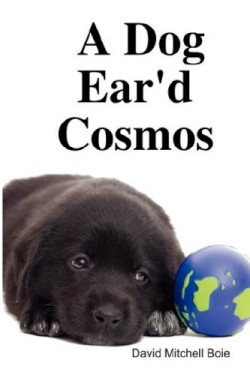A Dog Ear'd Cosmos
David Boie no relation to the Thin White Duke plays the questioning straight-man in a multi-subject dialogue with a long-dead pet Thompson. The dog as in the case of the British claymation duo Wallace and Gromit is heavily armed. Not a gimmick for its own sake Thompson stands in for the Holy Spirit and original innocence as well. “…the Magical World-view we each experienced in childhood does indeed have veracity…” He struggles to speak directly about existence but soon settles on a back circuit tour of the Ivory Tower as the safest way to share thoughts. The appendix consists of three poems.
The single-conversation format glides between subjects inside and outside physics suggesting unusual linkages. Boie pulls from Grand Unified Theory String Theory Zero-Point Energy the Doppler Effect and Relativity. He scores big by pointing out the implausibility of ethics-neutral research: “…science has given humanity the power to incinerate whole cities perhaps we might consider that the very concept of a value-free knowledge amounts to a diabolical contradiction in terms…” Applied psychology and linguistic concerns involve Transactional Analysis Gestalt the illusory nature of individual selves and English as a high-entropy language.
What’s between the lines is laminated with intellectual speculation; only the most oblique references get out. Despite constant efforts to depersonalize the discussion (not coincidentally one of his criticisms of the field of science) the word “forgiveness” regularly resurfaces like a submarine with no storage capacity for oxygen. Is it simply a need to apologize to Thompson the canine for an unmentioned wrong? No there appears to be a much more serious matter. The author is writing “…in a motel room mentally-ill and on medication struggling to find employment subsisting on social security and a stipend…” How the situation came about is not addressed after this early mention.
Linear cohesion in A Dog Ear’d Cosmos is purposely not a priority. The quasi-Platonic dialogue veers far into academic erudition and the second voice isn’t characteristically dog-like. The format threatens at times to disintegrate as Boie pokes holes in it. He asks “…have I just been talking with myself here…” He may be but some of the questions raised may have others doing so as well. For example: “…if space-time is curved what does it ‘curve around?’” Without pushing a rigid view he tries to clear room for faith persistent innocence inter-being. The boundary between the mind and the physical world becomes less absolute.
The tailor-made reader should be well versed in eastern religions and familiar with the main currents of cosmology. The Dog Ear’d Cosmos synthesizes idea-systems in the expectation that an educated audience will be ready to run alongside without much coaching. Boie offers challenging stimulation to the properly equipped people.
Disclosure: This article is not an endorsement, but a review. The publisher of this book provided free copies of the book and paid a small fee to have their book reviewed by a professional reviewer. Foreword Reviews and Clarion Reviews make no guarantee that the publisher will receive a positive review. Foreword Magazine, Inc. is disclosing this in accordance with the Federal Trade Commission’s 16 CFR, Part 255.

